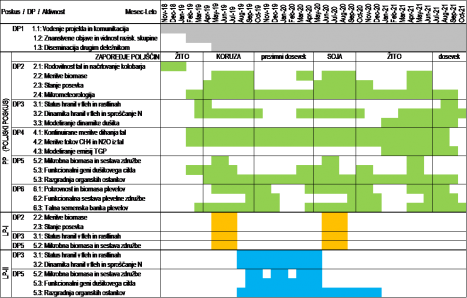Acronym
EcoFAR
Contract number
L4-9315
Department:
Department of Agronomy
Type of project
ARIS projects
Type of project
Aplikativni
Role
Lead
Duration
01.07.2018 - 30.06.2021
Total
1.34 FTE
Project manager at BF
Eler KlemenABSTRACT
Sustainable intensification of agricultural production is regarded as one of the main human efforts for the following decades. It includes increasing yields and food quality while simultaneously reducing negative environmental effects of agriculture (greenhouse gas (GHG) emissions, eutrophication, toxic effects of pesticides, soil quality decrease and loss of biodiversity). Ecological (or organic) agriculture (EA) is frequently proposed as an option to achieve these goals but substantial scientific progress and abandonment of unproven ideas and practices will be needed for EA to become more viable option.
Within this project we integratively address several key aspects of EA, where progress is urgently needed: (I) nutrient (particularly nitrogen) dynamics and losses, (II) soil greenhouse gas emissions, (III) soil microbiome functioning and its regulation using specific agricultural practices and bioeffector application and (IV) smart weed suppression based on the knowledge on the biology of weed species. The research is focused on arable production.
The main goal of the project is to test specific combinations of several management options which are known to substantially influence overall use-efficiency and consequently performance of EA. We experimentally manipulate soil tillage, covercroping and microbiome stimulation to observe the effects on crop growth and yield and on the above mentioned aspects (nutrients, GHG emissions, rhizosphere, weeds).
The experimentation is performed at two spatial scales: (1) field manipulation experiment, set up on an area with more than 18 years of conservation tillage and several years of EA regime, and (2) two mesocosm experiments, supporting the field experimentation. Within the field experiment several treatments are being compared in three consecutive growing seasons combining different types of soil tillage (reduced tillage vs. conventional ploughing), crop species (maize, cereal, soybean) and covercropping (present vs. absent). The activities to assess agroecosystem response to the experimental treatments include crop growth and final yield determination, climate and soil factors, nutrient status and dynamics, soil microbiome functioning (composition, N-transformation genes, microbial biomass), weed assessment (abundance, functional composition, soil seed bank), CO2, CH4 and N2O soil emissions and C / N modelling.
In mesocosm experiment No.1 we investigate the performance of the selected bioeffectors with scientifically proven action to stimulate plant stress tolerance and growth. The influence of bioeffectors on juvenile plant growth and emergence of several crop species and on soil microbiome functioning will be determined and compared with appropriate controls. Best performing bioeffector will also be used in the field.
Mesocosm experiment No.2 is set-up to assess temporal dynamics of soil N availability and plant N uptake during plant residue decomposition. The results will be important to better synchronize N release from residue mineralisation and N uptake by crops. We use the 15N enriched biomass of different crops and cover crops. Different residue incorporation depths are also compared.
The project activities are combined into six workpackages; first one is concerned with the project management, communication and visibility whereas the others combine scientific tasks of the same focal point (nutrients, weeds, soil microbiome, crop status, soil GHG emission).
Well-proven research methods are used or supervised by established researchers of the project team. Collaboration with some excellent foreign researchers and research groups further enhances the project feasibility. Special emphasis is given to the dissemination activities, which includes both scientific publishing and presentation of results to other professionals (policymakers, advisory service, and farmers) and other public.
THE PHASES OF THE PROJECT AND THEIR REALIZATION
The project is organised into six workpackages with each being further split into several activites. Workpackage 1 is a general one, concerned with project management and disseminaton. Within field experiment all research workpackages 2-6 will run while within mesocosm experiments only some of them. In a chart below the shedule of workpackages and activities within each segment of the project are listed.
External link to SICRIS link Open in new window

